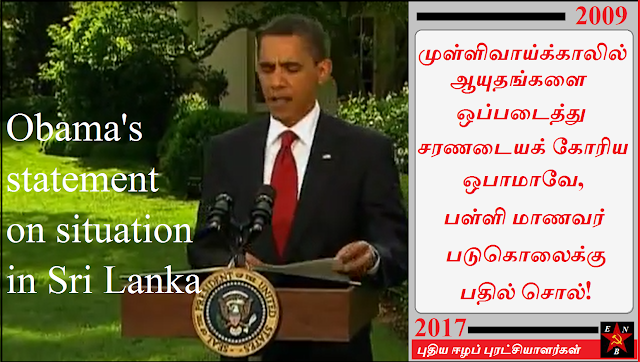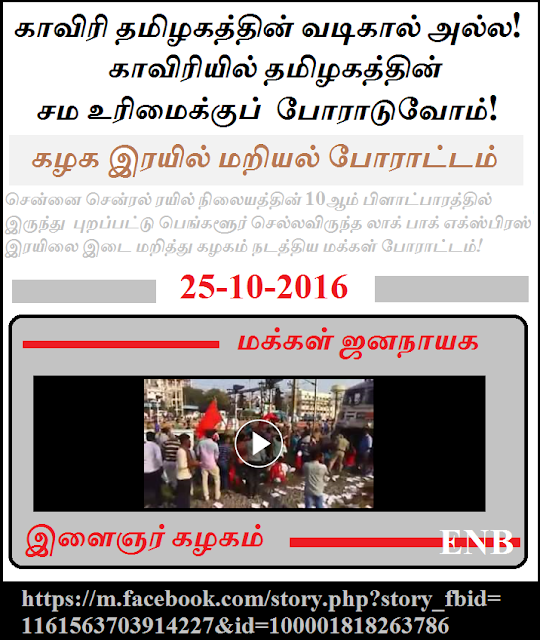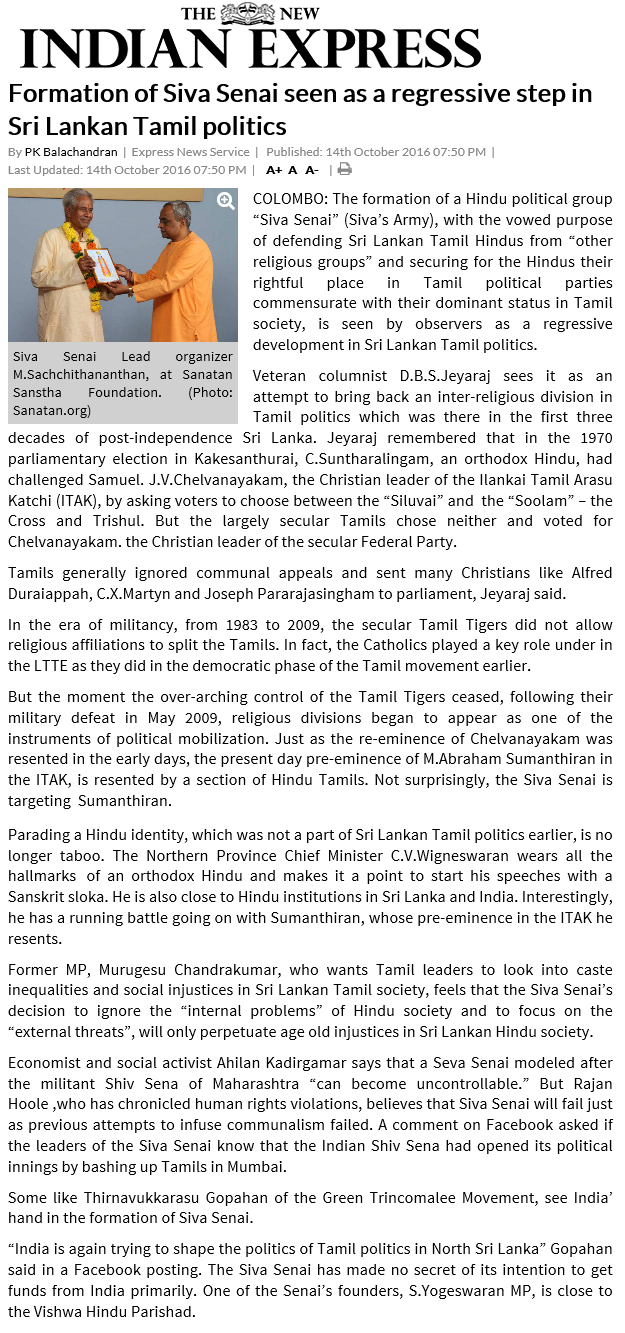16-10-2016
Kashmir uprising completes 100 days===========
Kashmir uprising enters 100th day today
Srinagar, October 16 (KMS): In occupied Kashmir, the ongoing intifada marked by cold-blooded killings, crippling injuries, curfew and restrictions completed 100 days, today, while anti-India protest rallies and shutdown continue across the territory.
The uprising that was triggered by the killing of Hizbul Mujahideen commander Burhan Wani by Indian forces on July 8 has left 110 people dead and several thousand injured, so far. More than 800 people sustained pellet injuries in their eyes with majority of them on the verge of losing eyesight partially or fully.
The Valley is also witnessing continued shutdown for the past 100 days. The authorities imposed curfew and restrictions for most of the period during these days. Mobile Internet services continued to remain suspended across the Kashmir Valley.
Meanwhile, protests and clashes broke out in various parts of the Valley including Srinagar, Shopian, Baramulla, Pulwama and Islamabad districts. The men in uniform barged into houses, damaged properties worth millions, vandalized household goods and subjected the inmates to brute torture in many areas.
All social and religious organisations like Jamaat-i-Islami, Jamiat-i-Ahle Hadees, Tehreek-e-Sawtul Awliya, Karwaan-i-Islami, Ummat-i-Islami, Anjuman-i-Tableeghul Islam and others launched a door-to-door campaign to raise funds for the support of curfew-hit transporters in the territory. Call for the drive was given by the joint Hurriyet leadership.
Protesters took to the streets after Zuhr prayers at Eidgah in Baramulla, today, and waved flags of Pakistan. They chanted pro-freedom and anti-India slogans.
The post-Ashura procession attended by thousands of people in Sankoo near Kargil turned into an anti-India protest demonstration. The participants raised slogans against the recent killings of Muslims in the Kashmir valley.
Around 100 houses were destroyed when they caught fire under mysterious circumstances in Kishtwar area of Jammu region.
A special police officer was stoned to death by two Hindu men in a remote village of Kathua district in Jammu region.
Kashmir uprising completes 100 days
ABID BASHIR
Srinagar, Publish Date: Oct 16 2016 11:17PM | Updated Date: Oct 16 2016 11:17PM GK
Fresh clashes erupted in some Kashmir areas on Sunday as the anti-India uprising completed 100 days which were marked by civilian killings, blinding of children and youth due to pellets, and massive repression on people by forces. At least 94 people have been killed and more than 15,000 injured in action by forces during this period, and at least 780 people were hit by pellets in eyes and a vast majority of them are on the verge of losing their vision, partially of fully. Even on the 100th day of the uprising on Sunday, reports of clashes and pro-freedom protests poured in from various areas, including Srinagar, even as police continued with the arrest youth and said 62 more were arrested on charges of “disrupting normal life” in the past 24 hours.
‘LONGEST SHUDOWN’
Kashmir has registered longest-ever continuous shutdown of 100 days on the call of joint resistance leadership including Syed Ali Geelani, Mirwaiz Umar Farooq and Muhammad Yasin Malik. Majority of historians and authors have agreed that the region has never seen a continuous shutdown for over three months. Noted poet and social activist, Zareef Ahmed Zareef, said this is for the first time in Kashmir’s history that people have themselves observed strike for 100 days.
SEPARATISTS CAGED
Police sources said over 150 separatist leaders/activists have been detained or arrested so far in the past more than three months. While Hurriyat Conference (G) chairman Syed Ali Geelani continues to remain under house arrest at his Hyderpora residence, Chairman of Hurriyat Conference (M) Miwaiz Umar Farooq is languishing in sub-jail at Chesmashahi, while JKLF chief Muhammad Yasin Malik has been lodged in Central Jail Srinagar. He was first lodged in police station Kothibagh on July 8, and then taken to Central Jail Srinagar where from he was shifted to police station Humhama. He was recently shifted back to Central Jail.
NO PRAYERS AT JAMIA MASJID FOR 14 WEEKS
The J&K government disallowed congregational Friday prayers at historic Jamia Masjid continuously for the past 14 weeks.
‘DEADLIEST DAY’
According to figures available with Greater Kashmir, at least 12 protestors died on July 9, the day after the killing of Burhan Wani in southern Kokernag village.
PELLETS KILL 14, BLIND HUNDREDS
The use of pellet guns proved lethal in Kashmir as at least 14 youth including two teenagers died of pellets in the past three months.
SITUATION ON SUNDAY
While markets across Kashmir, including Srinagar, opened after 5 pm on the relaxation call given by the joint resistance leadership, massive clashes broke out at Sonwar area in Srinagar after youth and women blocked the main road to stage a protest against the detention of a local Imam, Hafiz Riyaz Ahmed. The road witnessed massive traffic jam for nearly an hour after police resorted to heavy teargas shelling to disperse the protestors. Two people including a woman sustained injury in the police action. Locals said the Imam was called to police station Ram Munshibagh and later detained “without any reason.”
“The situation in the area had been relatively peaceful, but the unjustified actions by police, like the Imam’s detention, trigger protests in the area,” a group of protestors said. Earlier, locals said, two youth including a 12-year-old boy were detained by the police. Reports from north Kashmir’s Baramulla said clashes broke out this afternoon in old town Baramulla after police foiled a pro-freedom protest march in the area. According to reports, joint afternoon prayers were offered in Jamia Masjid. Soon after the conclusion of the prayers, a pro-freedom protest march was taken out but police from across the river Jhelum lobbed scores of teargas shells towards the protesters, triggering clashes which continued till evening. Meanwhile, the residents of Bunglowbagh, in old town alleged that police after entering the area resorted to ransacking of some residential houses. They said some persons suffered injuries during the police action. Reports from Sopore said people staged protests at Batpora and Sher Colony against the alleged vandalism by forces. Reports said pro-freedom protests were held in Ruhumoo. Locals of Kakapora, Pulwama alleged that forces ransacked houses there, triggering massive protests and clashes.
Reports from Central Kashmir’s Budgam district said at Gowharpora Chowk, clashes broke out after youth threw stones at forces’ vehicles. Forces fired tear-smoke shells to disperse the protestors. Meanwhile, reports said forces conducted nocturnal raids at Huproo, Batpora in Chadoora village, last night, where they allegedly beat up a few inmates too.
POLICE VERSION
According to a statement issued by the Zonal Police Headquarters Kashmir, situation across Kashmir remained normal and no untoward incident was reported from anywhere. “During the day normal life was observed across the valley as normal flow of vehicular traffic including the public transport was seen on the city roads as also in the main towns and inter-district roads of the valley,” it said. “Sunday market in Srinagar witnessed a huge rush of shoppers as people from different parts of the city and elsewhere thronged it to purchase different articles.”
The statement said in its sustained action to “curb the activities of miscreants”, police arrested 62 such individuals “involved in disrupting the public order in different parts of the valley during past 24 hours.”
(With inputs Altaf Baba, Khalid Gul, Gulam Muhammad, M A Dar)
==========
Shutdown continues in Kashmir as uprising completes 100 days 09:41 pm UTC 16 Oct, 2016
Over 90 killed, thousands injured, arrested; hundreds blinded
Kashmir Press Service Kashmir Age
Srinagar: The ongoing unrest in Kashmir, triggered by the killing of Hizbul Mujahideen militant Burhan Wani in an encounter with forces, today completed 100 days even as the Valley remained curfew-free in view of the improvement in the situation.
The unrest, which began a day after Wani was killed in an encounter in south Kashmir on July 8, has left 98 people dead including two cops and several thousand injured.
The Valley has witnessed continuous shutdown for the past 100 days with periodic relaxation as announced by the separatists who are spearheading the current agitation.
Reports say, that in last 100 days more than 15,000 were injured. Of the 4500 who received pellet injuries, the statement said 1000 received eye injuries. It put detentions at eight thousand of whom 450 were booked under Public Safety Act.
The strike has crippled normal life in the Valley as shops, business establishments and petrol pumps have remained closed except for the relaxation period.
The shutdown has affected the education of the children as schools, colleges and other educational institutions have been shut in the Valley.
Authorities also imposed curfew and restrictions on most of these 100 days, throwing normal life out of gear in the Valley.
However, there was no curfew anywhere in Kashmir today, a police official said, adding restrictions on the assembly of people under Section 144 CrPc were in force throughout the Valley as a precautionary measure to maintain law and order.
He said there was improvement in the situation with each passing day as more people were defying the Hurriyat-sponsored strike and coming out to carry their day-to-day activities.
There is increased movement of public transport, except buses, on the days when there are no restrictions.
Some shops also opened in some areas in the civil lines and outskirts of the city, the official said.
He said forces have been deployed in sensitive areas to maintain law and order.
The authorities had on Friday night restored outgoing call facility on prepaid mobile phone connections after three months in view of the improving situation.
However, mobile Internet services continued to remain suspended across Kashmir.
The situation across the Kashmir valley remained normal and no untoward incident was reported from anywhere, police said.
“During the day normal life was observed across the valley as normal flow of vehicular traffic including the public transport was seen on the city roads as also in the main towns and inter-district roads of the valley,” it said.
According to the statement, Sunday market in Srinagar witnessed a huge rush of shoppers as people from different parts of the city and elsewhere thronged it to purchase different articles.
The statement said that in its “sustained action to curb the activities of miscreants, police arrested 62 such individual involved in disrupting the public order in different parts of the valley during past 24 hours.”
Meanwhile, police on Sunday detained an Imam of a mosque from Srinagar’s Sonawar area.
Locals said that Riyaz Ahmed, who hails from north Kashmir’s Kupwara district, has been leading prayers at the masjid from past many years.
They said that a police party asked Ahmad to present himself at Ram Munshi Bagh police station in the afternoon. “He was detained there without any reason,” they said.
“He led Zuhr prayers at the masjid after which he told us that police has called him to Ram Munshibagh police station. We thought he will be back soon but we came to know that he has been detained,” said a group of locals.
They threatened to block the Srinagar-Jammu highway if the Imam was not released before Magrib (evening) prayers.
A group of youth appeared on Srinagar-Muzaffarabad highway near Lawaypora area of Srinagar today and smashed dozens of vehicles “for defying strike call of separatists”.
The Youth with masked faces threw stones on vehicles and damaged many of them near Ziarat Syed Ahmad Shah Kirmani (RA), at Lawaypora.
They also smashed window panes of the vehicles plying on the highway.
Pertinently, private transport has started moving on roads after many days despite the strike calls of separatists.
The crackdown also witnessed a ban on the newspapers, mobile internet has been snapped along with partial communication blockade and the approximate business losses have been estimated at more than Rs 10,000 crore.


































